Nigeria
Nigeria is a country in West Africa located in the Gulf of Guinea. With more than 203 million inhabitants in 2018, Nigeria is the most populous country in Africa and the seventh country in the world by its number of inhabitants. Located on the edge of the Gulf of Guinea, Nigeria has 4,047 km of land borders and 853 km of coastline. It is bordered to the west by Benin (773 km), to the east-southeast by Cameroon (1,690 km), to the north by Niger (1,497 km) and to the east-north- is via Chad (84 km). The country is the leading economic power on the African continent in 2016, and the 27th worldwide (GDP) according to the World Bank. The economic and demographic weight of Nigeria have earned it the nickname “Giant of Africa”. However, despite significant oil production and a diversified economy, the country remains relatively poor, notably due to high corruption. The last elections were held in February 2019 with the re-election of Muhammadu Buhari (from the Congress of Progressives party). Since 1991, the capital of Nigeria has been the new city of Abuja. The country is part of the Economic Community of West African States (ECOWAS) and the Organization of Islamic Cooperation (OIC). Its inhabitants are Nigerians.
Nigeria’s history
The Noks are the dominant civilization from the second to the sixth century, it spreads to the regions of Ife and Benin. From the sixth to eleventh century: installation of the Hausa civilizations in the north of the country, and Yoruba in the southwest. The Kanem empire (until the fourteenth century), then the Kanem-Bornou empire (at its peak in the sixteenth century) near Lake Chad dominated northern Nigeria for more than 600 years, thriving in their terminal position for the North-South exchanges between the Muslim States of North Africa and the peoples of the forest regions. In the early 19th century, Usman dan Fodio brought most of the northern regions of the country back under the control of an Islamic empire ruled from Sokoto. The kingdoms of Oyo in the south-west and the south-east of Benin devised political systems developed during the 15th to 17th centuries. The regions of Ife and Benin are also known for their artistic productions in ivory, wood, bronze and copper. In 1486, the Portuguese established contacts with the kingdom of Benin.
In 1553, the English destroyed the Portuguese vessels and from the 17th to the 19th century European merchants established coastal ports for the flourishing slave traffic to the Americas. This trade was replaced by that of raw materials during the 19th century. The government of the United Kingdom established legal status for the Royal Company of Niger in 1886. In 1900, this territory was divided into several protectorates and then became a colony in 1914. In response to rising nationalism after the Second World War, the British endowed the country of a representative government in 1951 then of a federal constitution in 1954. In 1958, Taiwo Akinkunmi composed the Nigerian flag. Nigeria achieved full independence in 1960. The country was then divided into three regions with broad autonomy.
The first republican constitution of 1963 leaves the country in the Commonwealth. In 1966, a coup d’etat fomented by various military groups brought to power General Ironsi, of Igbo origin, who was assassinated a few months later. The leaders of this new coup enlarge the power of the federal government and change the subdivision of the country which is now made up of twelve states. The Igbos, the majority ethnic group in the east of the country, were then victims of bloody racial reprisals which led in 1967 to the secession of the Republic of Biafra. A terrible war ensued, which ended in a capitulation of the separatists on January 12, 1970. In 1975, a bloodless coup d’état brought Murtala Ramat Mohammed to power. He promises a rapid return to democracy, but he is killed in an aborted coup and is replaced by his second Olusegun Obasanjo. A new constitution was established in 1977 and the first elections arrived in 1979, won by Shehu Shagari.
A new coup in 1983 plunged the country back under the dictatorship of the Supreme Military Council. In 1993, after elections canceled by the military government, General Sani Abacha came to the head of the state. Upon his sudden death in 1998, Abdulsalami Abubakar took power and restored the 1979 constitution. In 1999, the first democratic elections in 16 years were won by Olusegun Obasanjo, who was re-elected in the turbulent 2003 elections. In 2007, elections once again agitated bring to power the appointed successor of Olusegun Obasanjo: Umaru Yar’Adua. Umaru Yar’Adua died on May 5, 2010 from illness. Goodluck Jonathan officially succeeds him on May 6, 2010. The National Assembly approved on May 18, 2010 the appointment of Namadi Sambo as vice-president of Nigeria. Muhammadu Buhari was elected in the 2015 presidential election with 53.9% of the vote, after failing in this election in 2003, 2007 and 2011. He was invested on May 29, 2015. He is both chief of the ‘State and head of government.
Nigeria’s politics
Nigeria is a Federal Republic according to the Constitution dating from May 1999. The current president, both head of state and head of government, is Muhammadu Buhari invested on May 29, 2015. The country is subject to strong tensions between Muslims and Christians. The Igbos, the Yorubas and the Peuls (Fulanis) are the three majority ethnic groups; the Ogonis are a minority living in the Niger Delta, who opposed Shell because of the exploitation of oil without consideration for them. The Ijaws, an ethnic group living in the Niger Delta from which the hydrocarbons are extracted, have risen up against the government, which they accuse of colluding in the pollution of the environment. In 2009, clashes took place between MEND, the Niger Delta emancipation movement, and government forces. In addition, since 2009, the interventions of the Boko Haram movement, which aims to control the population of the northeast of the country, and to install sharia law in all the other states, has turned into an armed conflict with the forces. Nigerian armies, and on the fringes, with those of neighboring countries, Chad, Cameroon and Niger. The Boko Haram attacks have human (20,000 dead in Nigeria and more than 2 million displaced14) and economic repercussions, including firstly a food shortage. In 2014, a law was passed by the president punishing 10 years in prison for people who publicly display a homosexual relationship and 14 years in prison for those who marry a same-sex person, while homosexuality is already severely punished in Nigeria. . This law was passed unanimously by Nigerian parliamentarians in 2013.
Nigeria’s economy
Nigeria is the only country in the world with significant oil resources to present a budget deficit in 2007. A report by the non-governmental organization Global Financial Integrity of March 26, 2010 quantifies for the first time the illicit leakage of funds linked to financial practices outside the African continent. Nigeria is cited as the country by far the most vulnerable to the leakage of funds through illicit financial practices. It is estimated that from 1970 to 2009, capital flight from Nigeria amounted to $ 89.5 billion, at an average rate of $ 2 billion per year. The report also indicates that although much attention is generally paid to corruption processes (Nigeria is ranked 130th out of 180 in the Transparency International 200p ranking), the corruption index is 2.4 / 10. In the analysis of illicit cross-border flows, the funds concerned by these processes constitute approximately 3% of the total for the whole of Africa (no figure is given by country). Criminal practices linked to drug trafficking, racketeering, and counterfeiting account for 30 to 35%. The tax evasion processes, mainly through the techniques of commercial and financial rigging are by far the main component, constituting between 60 and 65% of the total. These massive and illegal leaks are facilitated by global opacity of the financial system.
In her intervention at the Convention on Europe, Eva Joly also underlines that Nigeria has “been plundered probably 20 billion dollars in thirty years, the funds are in Europe, mainly in England, in France, in Switzerland”. Economic inefficiency has also caused the flight of one hundred billion dollars, which came to invest abroad rather than inside the country, according to 2001 Nobel laureate in economics Joseph E. Stiglitz. In fact, barely a quarter of the population benefits from oil revenues.
At the end of September 2005, the World Bank helped recover 700 million dollars embezzled in Swiss banks by Sani Abacha and his clan while he was in power, 700 million blocked by Switzerland at the request of Nigeria in 1999 (the bank received 170 million for projects against poverty). The billion and a half dollars remaining diverted by the Sani Abacha clan is mainly located in France (550 million – not returned), the United Kingdom (60 million – returned), Luxembourg and Liechtenstein. Thanks to its oil resources, Nigeria is one of the main economic powers on the continent. This wealth has little effect on the standard of living of its population, which is on average in African countries. In 2015, more than half of Nigerians live on less than $ 1.25 a day. The five richest men in the country have a combined fortune of $ 29.9 billion, more than the country’s national budget as a whole. In a report, the NGOs Development Finance International and Oxfam denounce the responsibility of the authorities which “exacerbate inequalities by under-funding public services, such as health and education, and by not effectively fighting against tax evasion and corruption ”, while granting multinationals advantageous taxation.
In 2016, Nigeria is the second economic power in Africa, behind South Africa. The economic and demographic weight of Nigeria have earned it the nickname “Giant of Africa”. Financial institutions such as Morgan Stanley (United States) or Renaissance Capital (in) (Russia) had estimated that by 2025, Nigeria would become the first African economic power. However, these projections had ignored the fact that the bases for calculating Nigerian GDP had not been updated since 1990.
Nigeria’s demography
With an estimated population of 203 million in 2018, Nigeria is the most populous country in Africa. Less than 50% of the population lives in urban areas and at least 24 cities have more than 1,000,000 inhabitants. The birth rate is very high and demographic projections anticipate significant population growth in the future. According to a 2012 United Nations study, the population of Nigeria is expected to reach 440 million by 2050. Between January and June 2017, Nigeria is the first country of origin of migrants who cross the Mediterranean to reach Europe.
Nigeria’s education
Primary school lasts six years. The literacy rate was 57% in 2005 according to the National Empowerment Development Strategy, or 53.3% among adults over the age of 15 in 2006 according to the National Bureau of Statistics. It is higher in men (61.3%) than in women (45.3%). The literacy rate is constantly decreasing compared to 1999 (64.1%) and 1991 (71.9%). The study shows that it is significantly higher in the south of the country and particularly in the southeast (73.5%) than in the northwest (23.2%; men 31.0%, women 15.4% ).
Nigeria’s languages
Nigeria has a large number of languages. It is the first country in Africa in number of languages and as such has a remarkable “linguistic megadiversity”. A census carried out by SIL International reports 529 languages, including 522 living and 7 extinct. Today, three African languages have the status of major languages: Hausa, Yoruba and Igbo. They are taught in the school system, where each student must learn at least one. 27 other languages have the status of minor languages and primary education begins with one of them. Yoruba and Igbo are Nigerian-Congolese languages while Hausa is Afro-Asian. Kanuri, spoken in the northeast, mainly in Borno State, is a language of the Nilo-Saharan family. The three major families of African languages are thus present in the country. In addition, in some parts of Nigeria, ethnic groups speak more than one language. The official language of Nigeria, English, was chosen to facilitate the cultural and linguistic unity of the country. This choice was linked to the fact that a small part of the Nigerian population, especially its elite, spoke English following the British colonization which ended in 1960. Even if most of the ethnic groups prefer to communicate in their own language, English is used in particular for commercial transactions and for official purposes. English, however, remains a preserve of a small minority of the country’s urban elite, and it is not spoken at all in certain areas of the country, including the rural ones. The majority of Nigeria’s population lives in rural areas, so the major languages of communication in the country remain indigenous languages. Certain peoples, in particular the Yoruba and the Igbos, have derivatives of the standardized languages from a certain number of different dialects and which are widely spoken by these ethnic groups. Nigerian pidgin, often simply called “pidgin”, broken English or pidgin English, is a popular lingua franca (a Creole with English lexical base), with more or less regional influences on dialect and slang. It is widely spoken in the Niger Delta regions, mainly in those of Warri, Sapele, Port Harcourt, Agenebode, EWU, and Benin City.
While waiting to see the three major African languages of Nigeria occupy an official place, article 55 of the constitution states: “The affairs of the country are conducted in English as well as in Hausa, Igbo and Yoruba when appropriate measures have been taken. taken for this purpose. ” Thus, English, although being the official language of the country, can also be considered as a foreign language, because it is a language little mastered by the entire Nigerian population. The country’s great linguistic diversity is proving to be an obstacle to real linguistic unity. In addition, Nigeria is an English-speaking “landlocked” state between French-speaking states: Benin, Niger, Chad and Cameroon. Therefore, exchanges with these countries are important, hence the usefulness of spreading French among Nigerians. It was during the 1990s that the Nigerian federal government’s desire to francize the country was mentioned, in particular by considering compulsory teaching of French as a living language, or even the institution of French as a second official language. French has thus become the second compulsory foreign language after English. The development of French was nevertheless slowed down following the death of the dictator general Sani Abacha, the rapprochement of Nigeria with the United States, and because of the difficulties encountered (shortage of French teachers, lack of interest from the population , etc.). In 2014, the country replaced, despite these uncertainties, the development of its links with the Francophonie at the heart of its ambitions, and French, remaining compulsory, progressed despite the shortage of teachers. The French-speaking environment is one of the driving forces behind the teaching and learning of French in Nigeria. Finally, the awareness of its importance is progressing rapidly in the ruling classes and the middle classes.
-
Nigeria
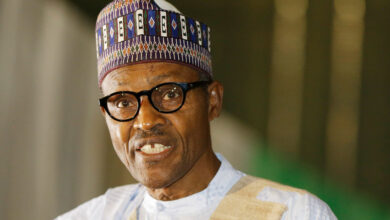
Nigerian President Urges Citizens To Avoid Panic Amid Terror Attack Warnings
Nigerian President Muhammadu Buhari on Friday urged people to avoid panic and remain calm in the wake of warning calls…
Read More » -
Nigeria
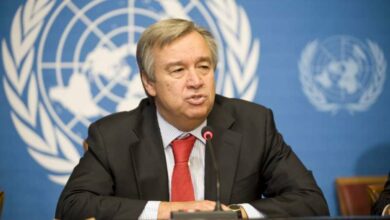
UN Chief Guterres Expresses Sadness At Devastation Caused By Floods In Nigeria
The United Nations (UN) Secretary-General Antonio Guterres on Friday expressed sadness at the devastation caused by floods in Nigeria this…
Read More » -
Nigeria
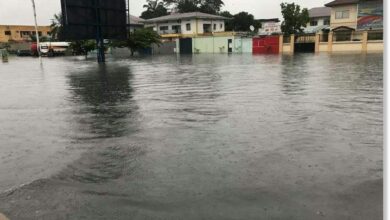
Nigeria’s Government: Death Toll From Worst-Ever Flooding Crosses 600 Mark
Nigeria’s ministry of humanitarian affairs on Sunday said over 600 people have lost their lives in the worst flooding the…
Read More » -
Nigeria
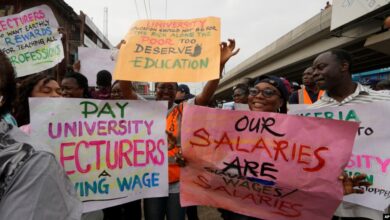
Nigeria’s Lecturers’ Union ASUU Suspend Prolonged Strike After Eight Long Months
Nigeria’s Academic Staff Union of Universities (ASUU) on Friday announced that it has decided to suspend a prolonged strike which…
Read More » -
Nigeria
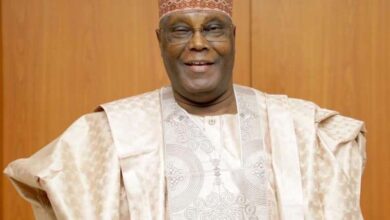
Nigeria’s Presidential Election Candidates Sign Accord To Commit Peaceful Campaign
Nigeria’s three top presidential election candidates signed an accord on Thursday committing to a peaceful campaign for the 2023 election,…
Read More » -
Nigeria

Nigerian President Buhari Vows To Hold Fair, Transparent, & Credible Elections
Nigerian President Muhammadu Buhari on Wednesday vowed to hold fair, transparent and credible elections in Nigeria, reported The Reuters. In…
Read More » -
Nigeria

Nigerian Government Signs Agreement With US Government To Return Looted Money
The Nigerian government signed an agreement with the United States of America (US) that will see the Washington government return…
Read More » -
Nigeria
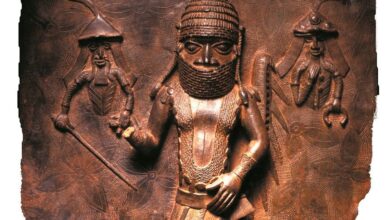
London Museum To Return A Collection Of Benin Bronzes To Nigerian Government
A London museum on Sunday agreed to return a collection of Benin Bronzes to Nigeria that colonial forces looted back…
Read More » -
Nigeria

Nigeria’s Health Body On High Alert Following Marburg Outbreak In Ghana
Nigeria’s Centre for Disease Control (NCDC) on Wednesday said it is on a high alert following Ghana’s confirmation of two…
Read More » -
Nigeria

Nigerian President Directs Education Minister To End ASUU Strike In Two Weeks
Nigerian President Muhammadu Buhari on Tuesday directed the Minister of Education, Adamu Adamu, to end the prolonged strike by the…
Read More » -
Nigeria

Nigeria’s Zamfara State To Allow Locals To Carry Guns Against Armed Militants
Nigeria’s Zamfara state authorities on Sunday called on the local people to arm themselves against criminal gangs in an attempt…
Read More » -
Nigeria
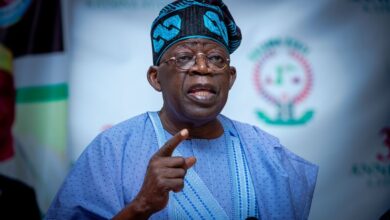
Nigeria’s Ruling Party APC Selects Bola Tinubu As Presidential Election Candidate
Nigeria’s ruling party, the All Progressives Congress (APC), Wednesday selected Bola Tinubu as its presidential candidate for the upcoming 2023…
Read More » -
Nigeria
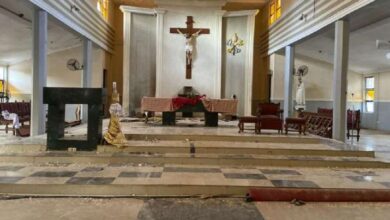
Nigeria: At Least 50 People Feared Dead After Gunmen Attack Worshippers At Church
At least 50 people including women and children were killed in southwestern Nigeria after gunmen opened fire on worshippers and…
Read More » -
Nigeria

Nigeria’s PDP Selects Former Vice President As Presidential Election Candidate
Nigeria’s main opposition party has selected former vice president, Atiku Abubakar, as its candidate to stand in elections to succeed…
Read More » -
Nigeria

Nigerian Government Sets Up Committee To Prevent Possible Spread Of Monkeypox
The Nigerian government on Friday established an inter-ministerial committee that will work to prevent the possible spread of the monkeypox…
Read More » -
Nigeria
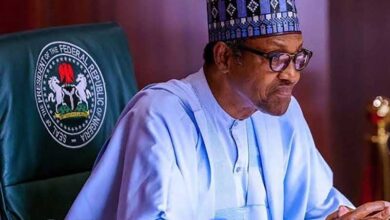
Nigerian President Directs Cabinet Ministers With Political Ambition To Resign
Nigerian President Muhammadu Buhari on Wednesday directed cabinet ministers to resign if they are willing to stand in next year’s…
Read More » -
Nigeria
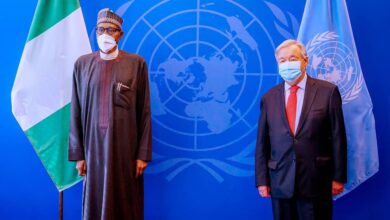
Nigerian President Buhari Thanks UN Secretary-General Guterres For Visiting Country
Nigerian President Muhammadu Buhari on Wednesday thanked United Nations (UN) Secretary-General Antonio Guterres for visiting the country, saying that he…
Read More » -
Nigeria

UN Chief Antonio Guterres Backs Nigeria’s Integration Of Militants & Insurgents
United Nations (UN) Secretary-General Antonio Guterres on Tuesday commended Nigerian authorities’ efforts to reintegrate repentant Boko Haram militants, reported Reuters.…
Read More » -
Nigeria
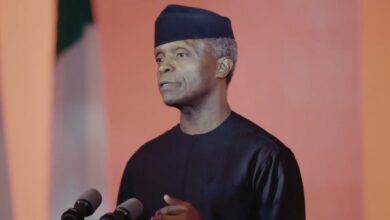
Nigeria’s Vice President Osinbajo Finally Declares His Intention To Run For President’s Post
Nigeria’s Vice President Yemi Osinbajo on Monday officially declared his intentions to run for the post of president, ending months…
Read More » -
Nigeria
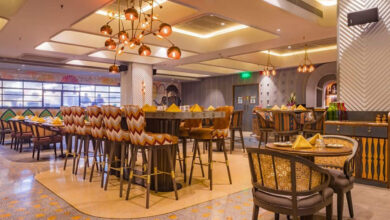
Nigerian Government Lifts Curfew & Other COVID-19 Restrictions On Party, Gatherings
The Nigerian government on Wednesday lifted the nationwide midnight curfew that was imposed last year to contain the spread of…
Read More » -
Nigeria

Nigerian Government Lifts Ban On Social Media Giant Twitter After Seven Months
The Nigerian government on Wednesday announced the lifting of the seven-month-long ban on social media giant Twitter, reported The BBC.…
Read More » -
Nigeria

Nigerian President Buhari Says Country Working On Developing Covid-19 Vaccine
Nigerian President Muhammadu Buhari on Thursday said the country is currently working to develop a Covid-19 vaccine, reported Reuters. Health…
Read More » -
Nigeria
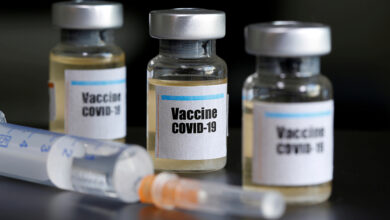
Nigerian Government Destroys Over One Million Expired Covid-19 Vaccine Doses
The Nigerian government on Wednesday destroyed more than one million doses of expired Astra Zeneca Covid-19 vaccine, reported Africa News.…
Read More » -
Nigeria
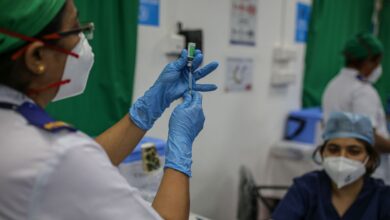
Nigerian Government Confirms First Case Of New Omicron Coronavirus Variant
The Nigerian government on Wednesday confirmed the country’s first cases of Omicron, the new Covid-19 variant, among two passengers who…
Read More » -
Nigeria
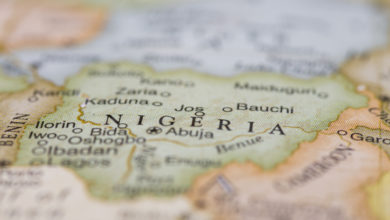
US Removes Nigeria From Religious Violators’ List Ahead Of Antony Blinken’s Visit
The United States (US) on Wednesday removed Nigeria from its list of countries with religious freedom concerns, reported Reuters. The…
Read More »

